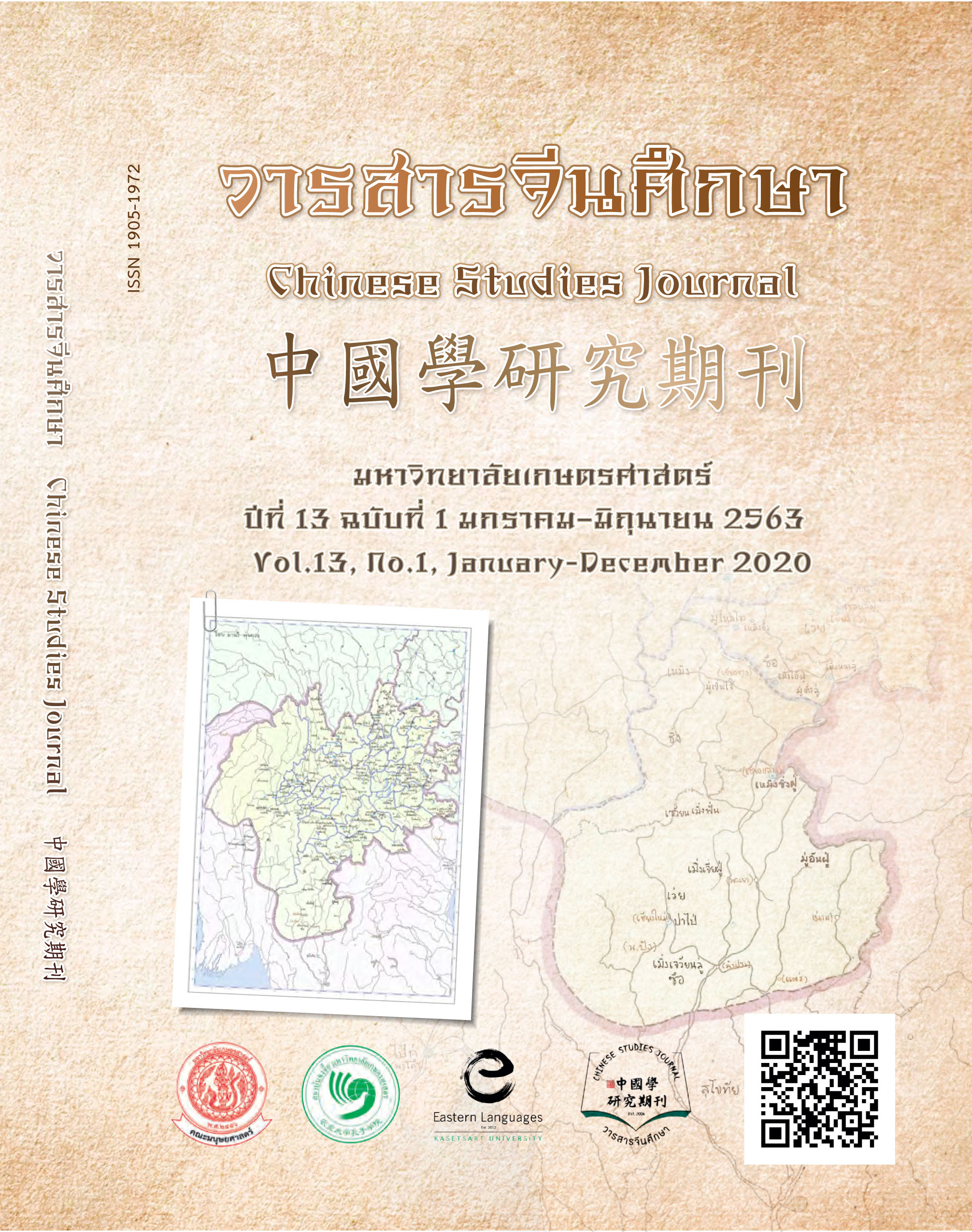A Semantic Cognition Comparative Study of the Word "Heart" in Chinese-Thai Language
Main Article Content
Abstract
Based on the theories of cognitive linguistics, this article makes a semantic cognitive comparison of the word "heart" in the "Modern Chinese Dictionary" and "Thai Royal Institute Dictionary " in order to discover the similarities and differences in semantic concepts, cultural connotations and cognitive methods of the "heart" in Chinese and Thai languages. We found that the meanings are basically same, the users of the two languages have a common cognitive style and also some differences. The semantic meaning of "heart" in both Chinese and Thai is based on the entity image of "heart", which leads to the meaning of "organs of thought and feelings " and the "center" of external entity space. The difference is that in Thai the "heart" have the meaning of "breath" The semantic similarities and differences of the words "heart" reflect the cognitive commonality of Chinese and Thai language users, and also reflect the cognitive differences caused by differences in natural geographical environment, social customs and culture.
Article Details
ผลงานทางวิชาการที่ลงตีพิมพ์ในวารสารจีนศึกษา มหาวิทยาลัยเกษตรศาสตร์ เป็นลิขสิทธิ์ของผู้เขียนหรือผู้แปลผลงานนั้น หากนำลงในวารสารจีนศึกษาเป็นครั้งแรก เจ้าของผลงานสามารถนำไปตีพิมพ์ซ้ำในวารสารหรือหนังสืออื่นได้โดยมิต้องแจ้งให้ทราบล่วงหน้า แต่หากผลงานที่ได้รับพิจารณานำลงในวารสารจีนศึกษา เป็นผลงานที่เคยตีพิมพ์ที่อื่นมาก่อนเจ้าของผลงานต้องจัดการเรื่องปัญหาลิขสิทธิ์กับแหล่งพิมพ์แรกเอง หากเกิดปัญหาทางกฎหมาย ถือว่าไม่อยู่ในความรับผิดชอบของวารสารจีนศึกษา มหาวิทยาลัยเกษตรศาสตร์ ทั้งนี้ ความคิดเห็นต่างๆ ในบทความเป็นความคิดเห็นส่วนตัวของผู้เขียน ไม่เกี่ยวกับกองบรรณาธิการวารสารจีนศึกษา มหาวิทยาลัยเกษตรศาสตร์
References
นานมีบุ๊คส์พับลิเคชั่นส์.
Lakoff,G.& Johnson,M. (1980). Metaphors we live by. Chicago: University of
Chicago Press.
Poompaisanchai, N. (2018).The comparison of semantic cognition: A case study of "Head" in Chinese-Thai Language วารสารศิลปศาสตร์ มหาวิทยาลัยแม่โจ้,01,199-210.
Ungerer,F.& Schmid, H.-J. (2008). An introduction to cognitive linguistics. Beijing: Foreign Language Teaching and Research Press & Pearson Education Limited.
常敬宇.(2009).汉语词汇文化.北京:北京大学出版社.
陈秀娟.(2013).汉语“心”和泰语“caj”的语义概念之对比分析.国际汉语
学报,4(02),89-97.
戴维、俞霞君.(2019).汉字“心”的隐喻和转喻认知分析.海外英语,03,73-
74,85.
方环海、高明乐.(2010).认知语言学的理论分析与展望.厦门大学学报哲学
社会科学版,04,13-19.
李仕春.(2011).跨文化交际视野下的汉泰核心词对比研究.北京:中国社会科
学出版社.
李树新.(2004).人体词语的认知模式与语义类推.汉字文化,04,8-12.
李瑛、王莲、田召见.(2019).认知语言学理论与应用.北京:中国经济出版社.
廖述娟、刘明.(2014).词汇习得的认知机制.开封教育学院学报,34(12),54-55.
林那然.(2019).含“口”字的汉泰成语探析.湖北科技学院学报,01,85-91.
陆俭明、沈阳.(2004).汉语和汉语研究十五讲.北京:北京大学出版社.
马清华.(2000).文化语义学.南昌:江西人民出版社.
齐振海、王义娜.(2007).“心”词语的认知框架.外语学刊,01,61-66.
申小龙.(2013).汉语与中国文化.上海:复旦大学出版社.
束定芳.(2008).认知语义学.上海:外语教育出版社.
王寅.(2007).认知语言学.上海:上海外语教育出版社.
王永红.(2012).词汇概念与语义的认知架构.西南农业大学学报社会
科学版,09,79-82.
许慎、徐铉.(1963).说文解字.北京:中华书局.
张毅.(2013).认知隐喻学多维跨域研究.北京:北京大学出版社.
中国社会科学院语言研究所词典编辑室.(2016).现代汉语词典(第7版).
北京:商务印书馆.


